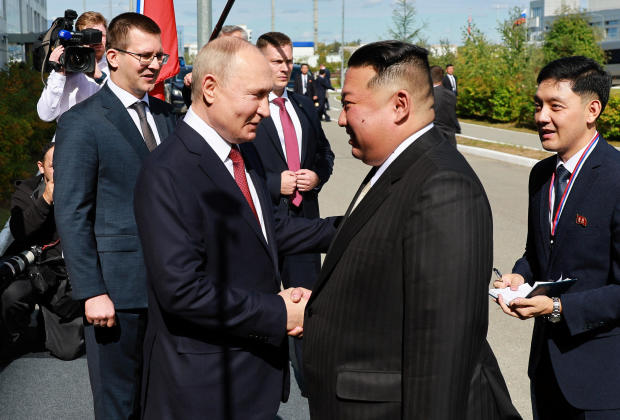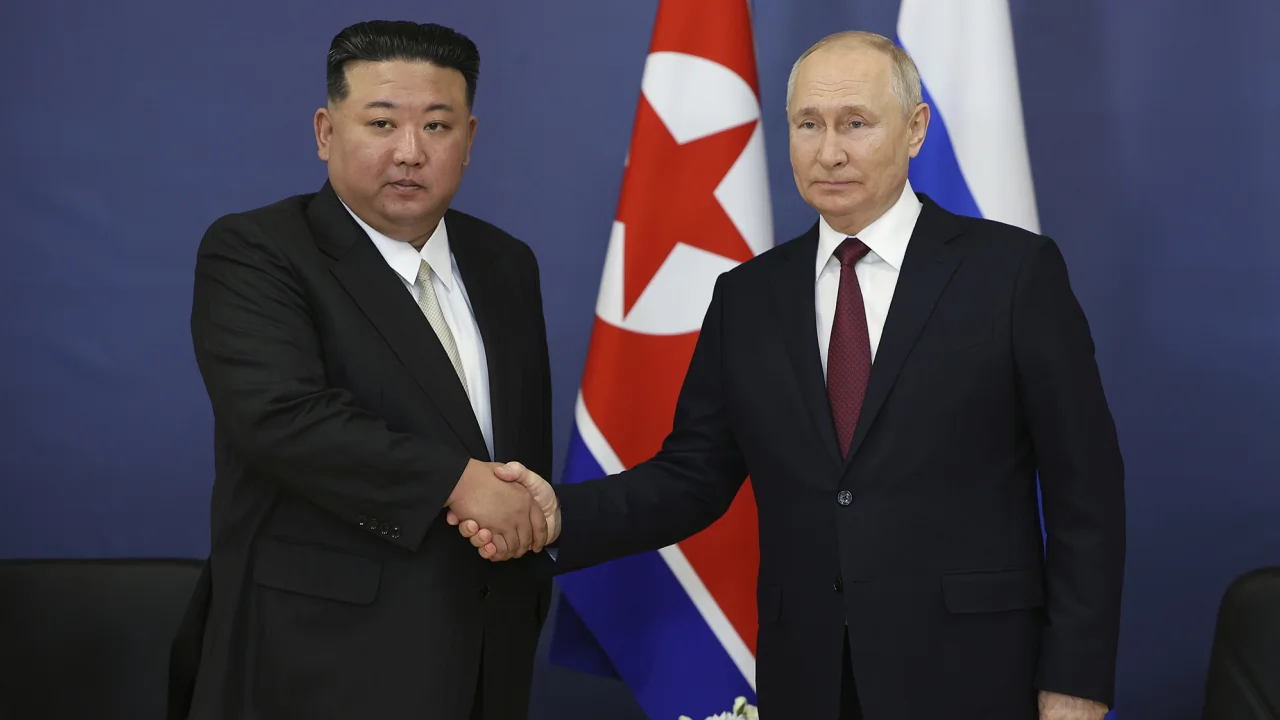Kim Jong Un And Putin Solidify Ties Amid Ukraine Conflict
Kim Jong Un and Putin solidify ties amid Ukraine conflict. The recent summit between North Korean leader and Russian President has sent shockwaves through the international community.
Author:Suleman ShahReviewer:Han JuSep 14, 20234.3K Shares219.6K Views

Kim Jong Un and Putin solidify ties amid Ukraine conflict. The recent summit between North Korean leader and Russian President has sent shockwaves through the international community.
The meeting, held at a remote Russian space launch facility, touched on various critical issues, including security interests, military cooperation, and satellite technologyexchange.
Pledge Of Unconditional Support
During their summit, Kim Jong Un made a significant declaration, assuring President Putin of North Korea's "full and unconditional support" for what he referred to as Russia's "sacred fight" to protect its security interests.
While the reference to Russia's war in Ukraine was implied rather than explicit, it was evident that Kim was aligning North Korea with Russia on the "anti-imperialist" front.
This alignment raises questions about the extent of their cooperation and its potential impact on the international stage.
The meeting at the remote Siberian rocket launch facility lasted approximately two hours but extended to a total of four to five hours in different formats.
It underscored the convergence of interests between North Korea and Russia, especially in the face of intensifying confrontations with the United States. This alignment suggests a strategic move to bolster their positions on the global stage.
“„The leader of North Korea shows great interest in space, in rocketry, and they are trying to develop space. We’ll show our new objects. We’ll talk about all the issues without haste, there is time.- Russian President Vladimir Putin
Kim's Support For Putin's Cause
During an official dinner following their one-on-one talks, Kim Jong Un expressed his confidence in the Russian army's ability to secure victory in a "just fight" against those pursuing "hegemony, expansion, and ambition."
“„We are confident that the Russian army and people will win a great victory in the just fight to punish evil groups who pursue hegemony, expansion, and ambition.- Kim told Putin
While Kim's remarks were somewhat cryptic, they were widely interpreted as an endorsement of Russia's military involvement in Ukraine. This support from the North Korean leader adds complexity to the geopolitical landscape.
Notably, the summit took place amid heightened tensions, as North Korea launched two ballistic missiles into the sea.
These missile tests, part of a provocative pattern since the beginning of 2022, appeared to be a calculated move by Kim Jong Un to accelerate North Korea's weapons development.
The short-range missiles covered a distance of about 400 miles each, raising concerns about regional stability.
The decision to hold the summit at Russia's primary domestic satellite launch facility raised questions about North Korea's objectives.
Kim seemed to be seeking Russian technical support for North Korea's efforts to develop military reconnaissance satellites, a critical component in enhancing the effectiveness of its nuclear-capable missiles.
North Korea has faced repeated failures in launching its first military spy satellite into orbit, underscoring the importance of external assistance.
Arms Deals And International Sanctions
Speculation has arisen regarding the potential for arms deals between North Korea and Russia, which would violate international sanctions.
Russia has previously supported these sanctions, making such a deal all the more contentious.
When questioned about the possibility of arms deals, Putin remained elusive, emphasizing opportunities for cooperation within the framework of international rules.
This ambiguity has raised concerns among the international community, including South Korea and the United States.
Kim Jong Un's decision to visit Russia after four years signifies North Korea's recognition of the "strategic importance" of its relations with Moscow.
This visit underscores the significance of their collaboration, which could have far-reaching consequences regionally and globally.
In conclusion, the summit between Kim Jong Un and Vladimir Putin has introduced a complex dynamic into international politics.
The world watches closely as these two leaders navigate a challenging geopolitical landscape, with their actions holding the potential to reshape the balance of power in the global arena.
Final Words
The recent summit between Kim Jong Un and Vladimir Putin has ignited significant interest and concern in the international community.
Their alignment on key issues, potential military cooperation, and shared interests in the face of global confrontations raise complex questions about the evolving geopolitical landscape.
As these two leaders engage in delicate negotiations and strategic moves, the world watches with a keen eye, fully aware that their decisions may have profound implications for global stability and power dynamics.

Suleman Shah
Author
Suleman Shah is a researcher and freelance writer. As a researcher, he has worked with MNS University of Agriculture, Multan (Pakistan) and Texas A & M University (USA). He regularly writes science articles and blogs for science news website immersse.com and open access publishers OA Publishing London and Scientific Times. He loves to keep himself updated on scientific developments and convert these developments into everyday language to update the readers about the developments in the scientific era. His primary research focus is Plant sciences, and he contributed to this field by publishing his research in scientific journals and presenting his work at many Conferences.
Shah graduated from the University of Agriculture Faisalabad (Pakistan) and started his professional carrier with Jaffer Agro Services and later with the Agriculture Department of the Government of Pakistan. His research interest compelled and attracted him to proceed with his carrier in Plant sciences research. So, he started his Ph.D. in Soil Science at MNS University of Agriculture Multan (Pakistan). Later, he started working as a visiting scholar with Texas A&M University (USA).
Shah’s experience with big Open Excess publishers like Springers, Frontiers, MDPI, etc., testified to his belief in Open Access as a barrier-removing mechanism between researchers and the readers of their research. Shah believes that Open Access is revolutionizing the publication process and benefitting research in all fields.

Han Ju
Reviewer
Hello! I'm Han Ju, the heart behind World Wide Journals. My life is a unique tapestry woven from the threads of news, spirituality, and science, enriched by melodies from my guitar. Raised amidst tales of the ancient and the arcane, I developed a keen eye for the stories that truly matter. Through my work, I seek to bridge the seen with the unseen, marrying the rigor of science with the depth of spirituality.
Each article at World Wide Journals is a piece of this ongoing quest, blending analysis with personal reflection. Whether exploring quantum frontiers or strumming chords under the stars, my aim is to inspire and provoke thought, inviting you into a world where every discovery is a note in the grand symphony of existence.
Welcome aboard this journey of insight and exploration, where curiosity leads and music guides.
Latest Articles
Popular Articles
